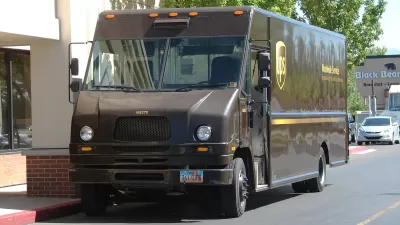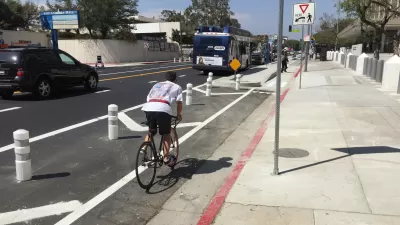The program deployed electric cargo bikes in a small Seattle neighborhood to test the effectiveness of replacing delivery trucks with lighter vehicles in the last mile of delivery.

A pilot program that used electric cargo bikes to make deliveries in a Seattle neighborhood reduced emissions for each package by 30 percent, reports Kristin Toussaint. The bikes were meant to replace delivery trucks that "cause congestion and spew carbon emissions as they drop off more and more packages" in the last mile of delivery. "The Seattle pilot—a partnership between the city, Coaster Cycles, logistics company AxleHire, and others, coordinated by the University of Washington’s Urban Freight Lab—tested last-mile alternatives like e-cargo bikes and delivery lockers, in hopes of finding solutions that reduced emissions and eased traffic."
Although it might seem like zero-emission delivery vehicles should reduce emissions by more than 30 percent, "researchers counted emissions from the truck bringing goods to the micro-hub, explains Anne Goodchild, founding director of the UW Supply Chain Transportation and Logistics Center, which launched the Urban Freight Lab."
"Along with reducing emissions, using e-bikes and the microhub halved the number of miles traveled per package compared to traditional truck routes, which helped to reduce congestion." While the pilot program had its limitations and may not show the same results at scale, improved bike lanes and parking infrastructure could help. "Testing these ideas before they can be called solutions is a crucial step in designing better last-mile delivery, and Goodchild hopes her lab’s research helps inspire additional delivery pilots."
FULL STORY: This e-bike delivery experiment reduced CO2 emissions by 30% per package

Maui's Vacation Rental Debate Turns Ugly
Verbal attacks, misinformation campaigns and fistfights plague a high-stakes debate to convert thousands of vacation rentals into long-term housing.

Planetizen Federal Action Tracker
A weekly monitor of how Trump’s orders and actions are impacting planners and planning in America.

In Urban Planning, AI Prompting Could be the New Design Thinking
Creativity has long been key to great urban design. What if we see AI as our new creative partner?

King County Supportive Housing Program Offers Hope for Unhoused Residents
The county is taking a ‘Housing First’ approach that prioritizes getting people into housing, then offering wraparound supportive services.

Researchers Use AI to Get Clearer Picture of US Housing
Analysts are using artificial intelligence to supercharge their research by allowing them to comb through data faster. Though these AI tools can be error prone, they save time and housing researchers are optimistic about the future.

Making Shared Micromobility More Inclusive
Cities and shared mobility system operators can do more to include people with disabilities in planning and operations, per a new report.
Urban Design for Planners 1: Software Tools
This six-course series explores essential urban design concepts using open source software and equips planners with the tools they need to participate fully in the urban design process.
Planning for Universal Design
Learn the tools for implementing Universal Design in planning regulations.
planning NEXT
Appalachian Highlands Housing Partners
Mpact (founded as Rail~Volution)
City of Camden Redevelopment Agency
City of Astoria
City of Portland
City of Laramie





























